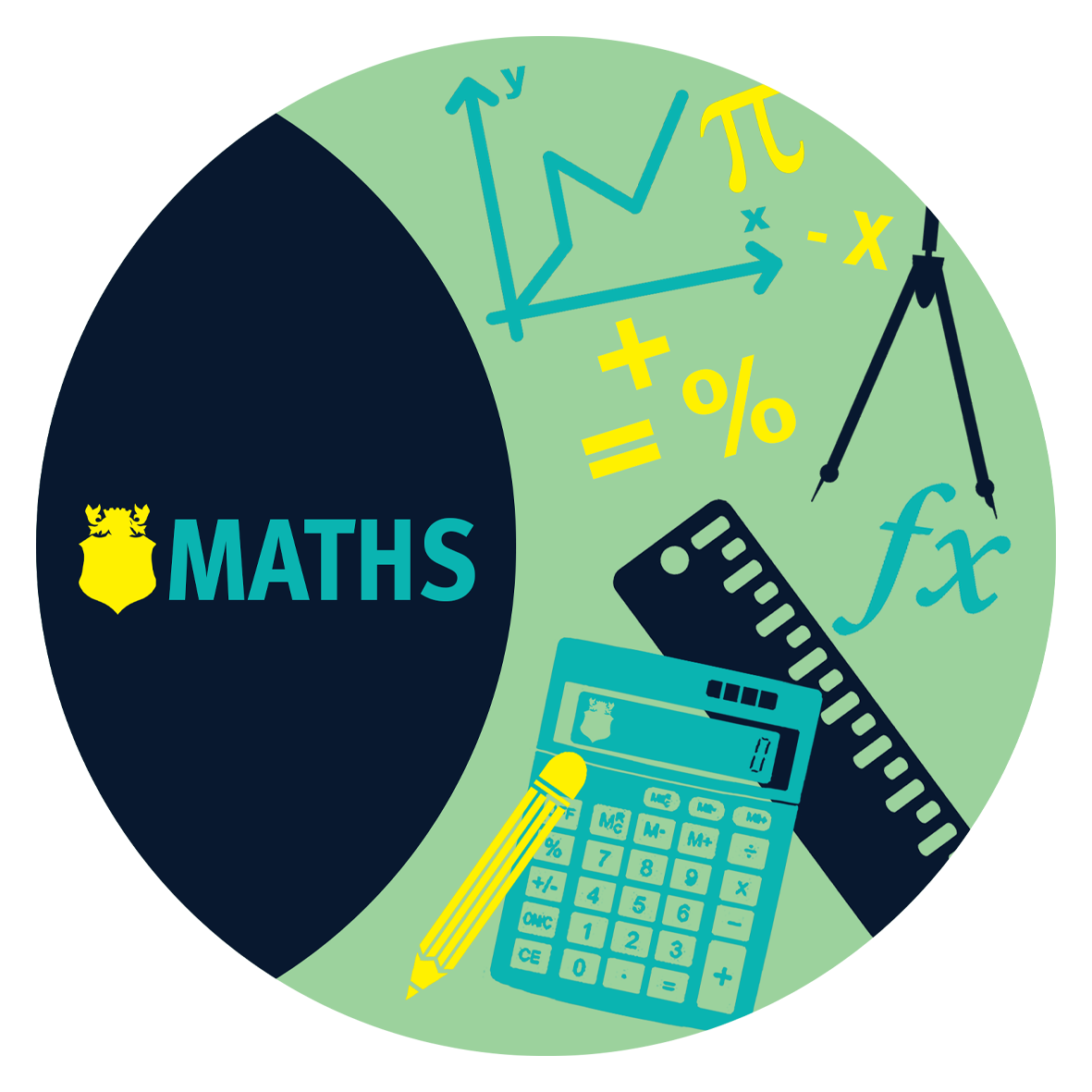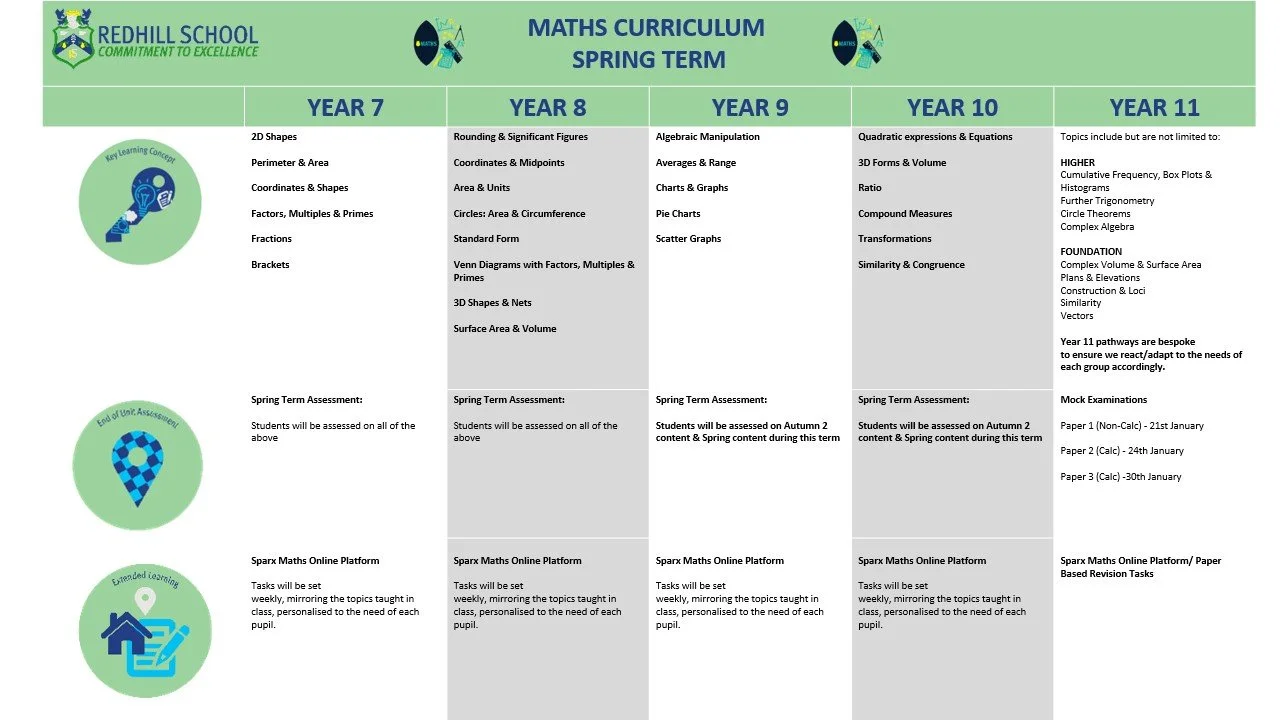Maths
SUBJECT OVERVIEW
Our mathematics team is made up of 12 staff, encompassing a wealth of experience and expertise. Several of our team have worked closely with the Central Maths Hub in developing as Mastery Specialists and PD leads, with others taking a strategic lead on curriculum, assessment and intervention.
As a core subject, mathematics makes up a significant part of a student's timetable.
In Year 7, students have eight mathematics lessons a fortnight, Year 8, seven lessons a fortnight and Year 9, eight lessons a fortnight. Our KS3 curriculum aims to build on the foundations of KS2 and instill confidence and resilience in our pupils.
In Year 10 and 11, students receive ten hours of mathematics instruction a fortnight as we move into our GCSE course. Pupils remain untiered until the Spring Term of Year 10, continuing to focus on key crossover topics, vital for success at either tier. During the Summer Term, pupils will move towards a tiered pathway, following the Edexcel GCSE specification. These pathways are flexible, and we consider each tiering decision on a case-by-case basis when making exam entries in Year 11.
Pupils are required to sit three, 1hr 30-minute papers at GCSE regardless of tier, with one paper non-calculator and the remaining two calculator. The marks of each paper are combined to give a total score out of 240 which equates to the final grade awarded.
INTENT
Our aim in mathematics is to provide a broad curriculum that builds upon prior knowledge, stretches pupils’ understanding and creates mathematical thinkers. Pupils will be exposed to both functional and fascinating mathematical concepts which aim to encourage logical thinking, effective problem solving and promote the importance of mathematics in day-to-day life.
All KS3 pupils follow the same adaptive programme of study, ensuring key skills from KS2 are consolidated and extended, building confidence and fluency with key threshold concepts, vital for future challenge. During Year 10, pupils join a tiered pathway as they move closer to GCSE. New, more complex concepts are taught, developed and interweaved in order to fully prepare pupils for the demands of their examinations.
Careful attention to mathematical language, command words and strategies for breaking down worded, multi-step problems are promoted, to ensure pupils are fully equipped for the rigour of the new specification.
Reactive, retrieval, extended learning and exam question exposure are all used to ensure pupils remain familiar and fluent with topic areas previously studied and encourage pupils to make links between concepts and methods across the mathematical strands.
Maths Curriculum - AUTUMN Term
WIDER SCHOOL OPPORTUNITIES
Vital mathematical skills such as basic arithmetic, percentages and area are linked to real life scenarios wherever possible to highlight the importance of being able to calculate cost, change, discounts etc in day-to-day life as well as cross-curricular links made where appropriate.
Softer skills developed include an ability to think and work systematically as well as how to generate strategies to problem solve when required.
Additional opportunities offered in mathematics, include the UKMT Maths Challenge which is facilitated at both a Junior and Intermediate level, with several students a year, qualifying for further national follow-on rounds.
We also currently offer Level 2 Certificate in Further Mathematics for students who may wish to study mathematics at A Level or simplify expand their own mathematical knowledge further.
SMSC
Spiritual Moral Social and Cultural development
Spiritual development – pupils are asked to be open and receptive to new mathematical concepts and methods. Pupils are encouraged to reflect upon their own strategies and consider their success, choosing the most effective approach for the problem at hand. Many problems can be solved in a multitude of ways, so being creative in the way in which questions are tackled can often help get to an answer more quickly!
Moral development – as with any lesson, pupils are aware of the expectations within a Mathematics classroom and how making positive choices, helps create a more effective environment for learning. In terms of content, our subject in itself could be argued as giving entirely right or entirely wrong answers. Acceptance of a variety of approaches is nurtured and pupils are encouraged to justify their answers with mathematical reasoning.
Social development – we endeavour to give the skills we teach a real-life context wherever possible so pupils can relate to the process being used. A prime example of this is when teaching percentages, we often give a financial context including things like trading games and stocks and shares. We can often use this as an opportunity to talk about the issues surrounding financial awareness and risk.
Cultural development – wherever possible we aim to add in cultural elements to Mathematics referencing famous Mathematicians and their backgrounds as a hook before a topic, or looking at numerical elements of art such as tessellation in Islamic art. We also work a lot with money and currency and encourage awareness of different monies throughout the world.
USEFUL LINKS




